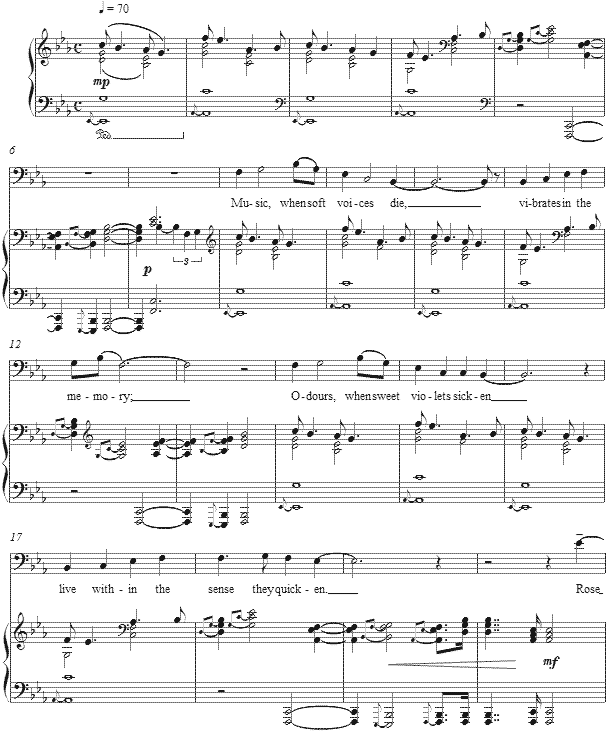Music and Texts of GARY BACHLUND
Vocal Music | Piano | Organ | Chamber Music | Orchestral | Articles and Commentary | Poems and Stories | Miscellany | FAQs
Music, when Soft Voices die - (2009)
Percy Bysshe Shelleyfor baritone and piano
for baritone Bruce Perry
Music, when soft voices die,
Vibrates in the memory;
Odours, when sweet violets sicken,
Live within the sense they quicken.
Rose leaves, when the rose is dead,
Are heap'd for the belovèd's bed;
And so thy thoughts, when thou art gone,
Love itself shall slumber on.[ 2 pages, circa 2' 30" ]
Percy Bysshe Shelley
The life of this intellect, poet, dramatist and philosopher is open to any history buff through many sources, though one might comment in this day that his marriage to Mary Shelley, the creator of the Frankenstein story, is perhaps his great achievement. Dying by drowning at age 29, his achievements in letters was remarkable though his attacks on religion earned him both praise and criticism. Even to this day, his supposed brand of atheism is rarely explored, for he wrote in his Oxford tract, The Necessity of Atheism, "There Is No God / This negation must be understood solely to affect a creative Deity. The hypothesis of a pervading Spirit co-eternal with the universe remains unshaken." Thus, like Darwin's later achievement in which he mentions "the Creator," there lies behind this 19th century atheism a deeper and more appreciative sense of that "pervading Spirit" of which Shelley clearly espoused. To simplify his subtle argument therefore is to dismiss in either direction.
The text was suggested to me by Bruce Perry, all around musician teaching at Drake University. Having thought of setting other texts, this particular text had escaped my notice, though I learn many other settings of the text exist. This did not dissuade me.
The poem moves through four distinct moments in its two verses. From music to the sense of smell to the symbolism of love to the notion of thought, personality and mortality when "love itself shall slumber on." For this, the setting is clearly in four quasi-strophes, the first and second couplets set rather alike, while the reminiscence of sensual love urges the vocal range to its highest point, and the solemnity of loss ends the setting in a quiet way.
Bruce Perry
Drake University teaching artist Bruce Perry teaches studio voice and vocal literature, maintains an active musical schedule as conductor and performer, conducts the Fort Dodge Choral Society as well as serves as worship and music coordinator for Grace Lutheran Church in Fort Dodge, Iowa, and is chair of worship in music for Iowa Choral Directors Association. As a pianist, Perry has performed throughout the Midwest and in Brazil. He holds degrees in piano and vocal performance from Luther College and the University of Iowa.
The score for Small Homes is available as a free PDF download, though any major commercial performance or recording of the work is prohibited without prior arrangement with the composer. Click on the graphic below for this piano-vocal score.


